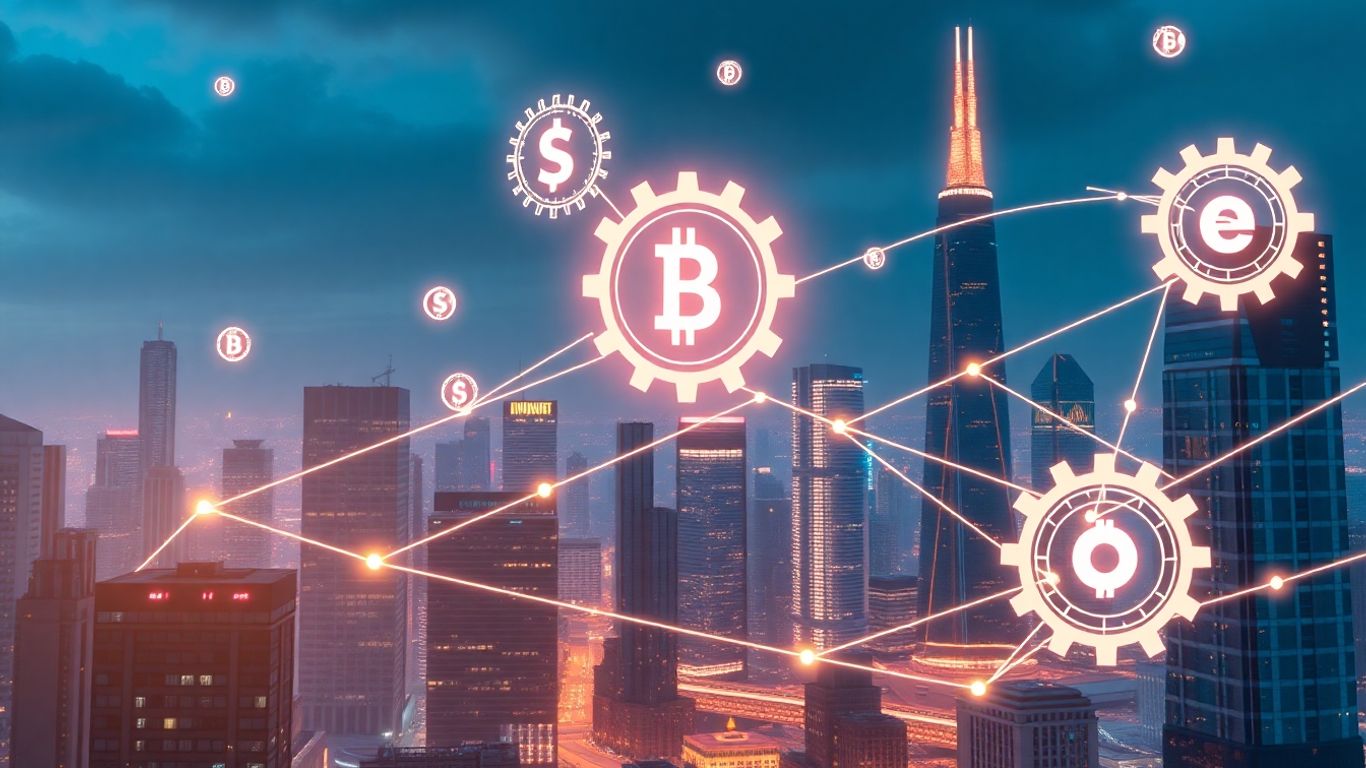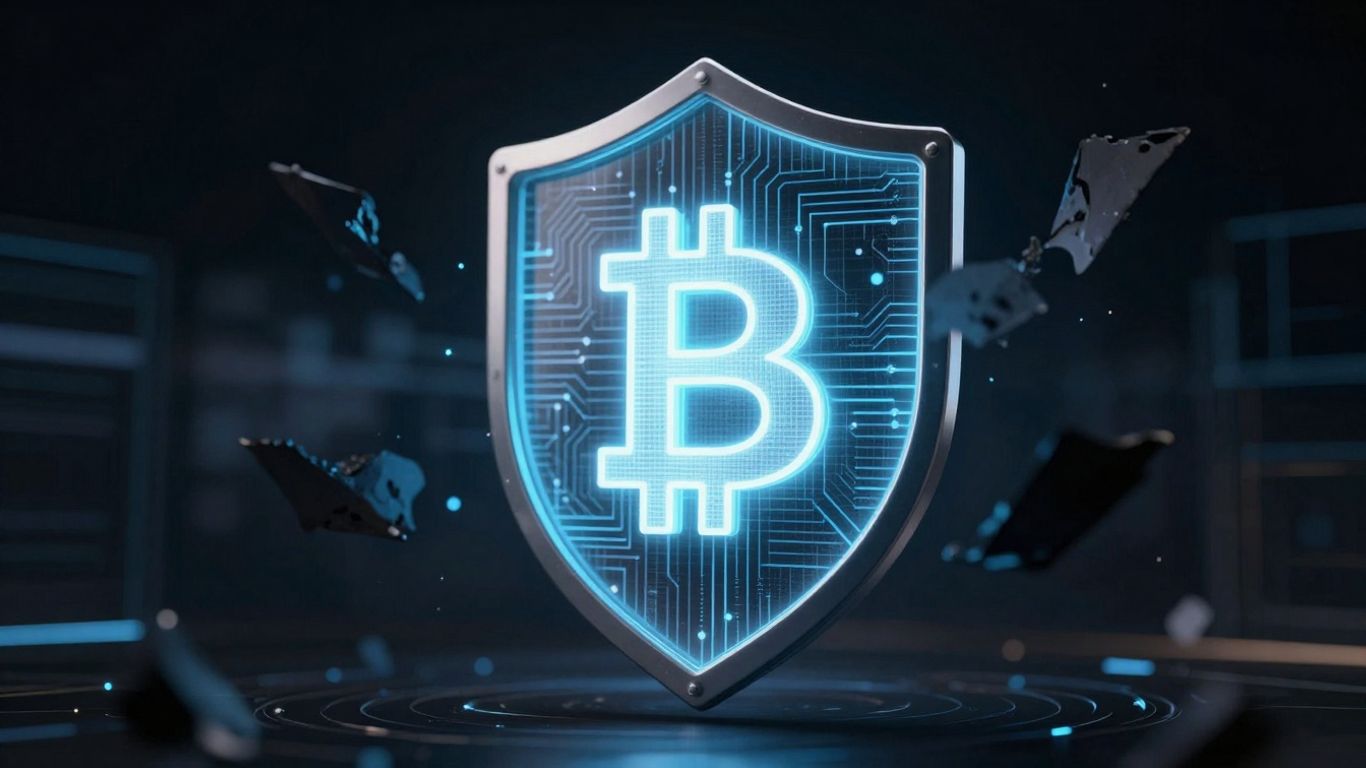[ newsletter ]
Stay ahead of Web3 threats—subscribe to our newsletter for the latest in blockchain security insights and updates.
Thank you! Your submission has been received!
Oops! Something went wrong. Please try again.
Explore the future of finance where blockchain and audit intertwine. Discover how these technologies enhance security, transparency, and efficiency in financial transactions and auditing.





It feels like every day there's a new headline about blockchain or AI changing the world. In finance, these two technologies are really starting to show how they can work together, especially when it comes to keeping things honest and accurate. Think about it: we need ways to trust that our money is safe and that financial records are correct. This is where blockchain and audit come into play, offering some pretty interesting solutions to old problems.
Think about how we used to do business. You knew the person you were trading with, or at least someone who knew them. Trust was built on relationships, on knowing faces and reputations. But our world got bigger, and we started dealing with people we didn't know at all. This is where traditional finance stepped in, creating big institutions like banks and regulators to act as the go-betweens. They became the trusted third parties, the ones who verified everything and made sure deals went through. It worked, mostly, but it also meant a lot of control was in the hands of a few, and sometimes, things could get slow or expensive.
The shift from a society of familiar faces to one of strangers meant we needed new ways to build confidence in our financial dealings. This created a need for reliable systems that could bridge the gap when direct personal trust wasn't an option.
Now, blockchain is shaking things up. Instead of relying on one central authority, blockchain uses a shared, digital ledger that's spread across many computers. This makes it really hard to tamper with because any change needs to be agreed upon by the network. It's like having a public record book that everyone can see but no one person can alter. This transparency and the way it's secured by code can help bring back a different kind of confidence. It's not about trusting a person or a company as much as it is about trusting the system itself. This algorithmic trust is a big deal for making financial systems more open and less prone to single points of failure.
And then there are smart contracts. These are basically self-executing contracts where the terms of the agreement are written directly into code. They automatically carry out actions when certain conditions are met, without needing any middlemen. For example, if a shipment arrives on time, a smart contract could automatically release payment. This removes the need for a third party to oversee the transaction, reducing potential delays and disputes. It's a way to automate trust, making agreements more reliable and efficient because the code enforces the rules.
Think about how money moves around today. It often goes through a bunch of different hands, each one adding a layer of complexity and, let's be honest, potential for error or even mischief. Blockchain changes this game. It's like a digital ledger that everyone involved can see, but nobody can secretly alter. Every transaction is recorded, verified by a network of computers, and then added to a chain of previous transactions. This makes it incredibly hard to tamper with. This inherent transparency and security are big deals for financial operations. It means fewer chances for fraud and a clearer picture of where money is going.
Smart contracts are a really neat part of blockchain. They're basically computer programs that automatically carry out the terms of an agreement when certain conditions are met. Imagine buying a house. Instead of a mountain of paperwork and waiting for approvals, a smart contract could automatically transfer ownership and funds the moment all the agreed-upon conditions are satisfied. This cuts out a lot of the middlemen and speeds things up considerably. It's like having a digital notary and escrow agent all rolled into one, working 24/7.
For ages, we've relied on banks, clearinghouses, and other institutions to make sure financial dealings happen correctly. They're the trusted third parties. But this reliance comes with costs – fees, delays, and sometimes, a lack of clarity. Blockchain, with its distributed nature, allows people to interact and transact more directly. This peer-to-peer approach can lower costs and make processes faster. It shifts trust from a central authority to the network itself, which is verified by code and consensus. It's a fundamental shift in how we think about who or what we need to trust to get things done financially.
The move towards blockchain in finance isn't just about new technology; it's about rethinking the very foundations of trust and efficiency in how we exchange value. It offers a path to more direct, secure, and less costly financial interactions by distributing control and verification across a network rather than concentrating it in a few hands.
Artificial intelligence is really changing how auditors do their jobs. Instead of just looking at samples, AI can sift through massive amounts of financial data way faster than any human team. This means it can spot tiny errors or unusual patterns that might otherwise get missed. Think of it like having a super-powered magnifying glass for every single transaction. This shift moves auditing from a reactive process to a more proactive one, catching issues before they become big problems.
When you combine AI with blockchain, things get even more interesting for auditors. Because blockchain records transactions in a way that's hard to tamper with, it creates a reliable source of truth. AI can then monitor this ledger in real-time. If something looks off – maybe a transaction that doesn't fit the usual pattern or a sudden spike in activity – the AI can flag it immediately. This is a big deal for preventing fraud and making sure everything is on the up and up.
Here's a look at how this works:
Auditing often involves a lot of tedious checking of documents and records. AI is stepping in to automate a lot of this. It can read invoices, match them to purchase orders, and verify that everything lines up. This frees up auditors to focus on more complex tasks that require human judgment, like assessing the overall financial health of a company or understanding the business context behind the numbers. It's not about replacing auditors, but about giving them better tools to do their jobs more effectively.
The integration of AI and blockchain is not just about making audits faster; it's about making them more thorough and reliable. By automating routine checks and providing real-time insights, these technologies help build a stronger foundation of trust in financial reporting.
It's pretty wild how blockchain and AI are starting to work together, right? They're not just separate cool technologies anymore; they're actually making each other better, especially in the world of finance. Think of it like this: blockchain provides this super secure and transparent way to record everything, like a digital ledger that nobody can mess with. Then, AI comes in and can actually make sense of all that data, finding patterns and predicting what might happen next. This combination is changing how we trust and manage money.
AI is getting really good at looking at huge amounts of financial data and spotting trends that humans might miss. When you combine this with blockchain's reliable data, AI can make much smarter predictions. This means banks and investment firms can get a better idea of market movements, figure out where to put their money for the best results, and even anticipate customer needs before they even ask.
Here's a quick look at what AI brings to the table with blockchain data:
Managing risk is a big deal in finance, and AI is a game-changer here. On a blockchain, all transactions are recorded immutably. AI can constantly scan this ledger for anything that looks suspicious or deviates from the norm. This means potential fraud or security breaches can be flagged almost instantly, long before they become major problems. It's like having a super-vigilant security guard watching over all the digital money.
The ability of AI to process vast, immutable datasets from blockchains allows for proactive identification of anomalies and potential risks. This moves risk management from a reactive stance to a more predictive and preventative one, significantly bolstering the security of financial systems.
When you put AI and blockchain together, you get a powerful engine for new financial ideas. Think about things like automated loan approvals based on verified data, or more efficient ways to track and manage digital assets. This partnership is not just about making existing processes faster; it's about creating entirely new financial products and services that were impossible before. It's a pretty exciting time for anyone watching the finance world evolve.

Lots of companies are already putting this blockchain and AI stuff to work. Take JPMorgan Chase, for example. They've been using blockchain for things like cross-border payments, making them faster and cheaper. Then there's IBM, which has been exploring blockchain for supply chain finance, giving businesses better visibility into their transactions. These aren't just theoretical ideas; they're actual projects making a difference.
It's not just about making existing processes better; it's about creating entirely new ways of doing things. Think about how AI can analyze the vast amounts of data on a blockchain to spot unusual patterns that might indicate fraud or errors. This combination is pretty powerful. It means we can have more trust in digital transactions without needing as many middlemen.
The real magic happens when you combine the immutable record-keeping of blockchain with the analytical power of AI. This synergy allows for unprecedented levels of security, efficiency, and insight in financial operations.
What can we learn from the companies that are ahead of the curve? Well, it's clear that a phased approach is often best. Start with a specific problem, like improving transaction speed or detecting fraud, and then build out from there. It also seems important to have a team that understands both the technology and the business needs. Getting the right people involved makes a big difference.
So, we've talked a lot about how great blockchain and AI can be for finance and auditing. But let's be real, it's not all smooth sailing. There are definitely some bumps in the road we need to figure out before this tech really takes over. It's like trying to assemble IKEA furniture without the instructions – looks simple, but can get complicated fast.
One of the big hurdles is just the sheer technical side of things. Blockchain, while amazing, can be slow. Think about processing thousands of transactions per second – some blockchains just can't keep up yet. This is where scalability comes in. We need systems that can grow with the demand. Plus, getting different blockchain systems to talk to each other, or to older, existing financial systems, is a puzzle. It's not as simple as just plugging things in.
This is a tricky one. Blockchain is known for transparency, which is great for audits, but what about sensitive financial data? We need to make sure that while transactions are visible, the actual private information of individuals and companies stays protected. It's a balancing act between openness and confidentiality. Finding ways to keep data private while still using the benefits of a shared ledger is key.
The push for decentralized trust, while powerful, brings up questions about who is responsible when things go wrong. In a system without a central authority, accountability can become blurry, which is a significant concern for regulators and users alike.
Regulators are still trying to catch up with all this new technology. Laws and rules that were made for the old way of doing things don't always fit neatly with blockchain and AI. This uncertainty makes businesses hesitant to fully jump in. We need clearer guidelines on how these technologies should be used, especially when it comes to financial reporting and audits. It's a bit like trying to play a game where the rules keep changing. This is why understanding the blockchain technology's potential is so important for everyone involved.
Here's a quick look at what needs attention:

So, what's next for blockchain and auditing? It's a pretty exciting space right now, with a lot of new ideas popping up. We're seeing things like Decentralized Finance, or DeFi, really start to take hold. This whole idea of finance without the usual banks and middlemen is a big deal, and it means auditors will have to get used to checking systems that aren't controlled by a single company.
DeFi is basically taking financial services – like lending, borrowing, and trading – and putting them on blockchain networks. This means transactions can happen directly between people, without needing a bank in the middle. For auditors, this is a whole new ballgame. Instead of looking at a company's internal records, they'll be examining code and smart contracts on a public ledger. It's all about verifying the integrity of the code and the network itself.
Another huge trend is tokenization. Think about it: real-world assets, like real estate or art, being turned into digital tokens on a blockchain. This makes them easier to trade and divide up. For auditors, this means a shift from checking physical assets or traditional financial statements to verifying the ownership and authenticity of these digital tokens. It's a complex process that requires new tools and a different way of thinking about asset verification.
We've talked about AI in auditing, but the future is really about explainable AI. Right now, some AI can be a bit of a black box – it gives an answer, but we don't always know how it got there. In auditing, especially when dealing with sensitive financial data, we need to know why the AI flagged something or made a certain recommendation. This means developing AI systems that can clearly show their reasoning, making the audit process more transparent and trustworthy.
The integration of blockchain and AI is not just about making things faster; it's about fundamentally changing how we establish and maintain trust in financial systems. As these technologies mature, the role of the auditor will evolve from a traditional record-keeper to a digital trust validator.
This shift requires a continuous learning approach for audit professionals. Staying updated on the latest blockchain protocols, smart contract languages, and AI advancements will be key to effectively auditing these new financial landscapes. The goal is to build confidence in these new systems, just as we have with traditional ones, but with the added benefits of speed, security, and transparency that blockchain and AI can provide.
So, where does all this leave us? It's pretty clear that blockchain and auditing aren't just going to coexist; they're becoming best buds. Think of it like this: blockchain is building a super secure, transparent record of everything that happens financially. And auditing? Well, it's evolving from checking those records after the fact to becoming an integrated part of the process, making sure everything is on the up-and-up in real-time. It's not just about catching mistakes anymore; it's about preventing them and building a more trustworthy financial world for everyone. The tools are changing, and so are the jobs, but the goal of financial integrity remains the same. It's an exciting time to watch this all unfold.
Imagine a digital notebook that's shared with many people. Every time something new happens, like a payment, it's written down in the notebook. Everyone gets a copy, and once something is written, it can't be erased or changed. This makes it super secure and honest. In finance, this means transactions can be recorded safely and openly, cutting out the need for middlemen and making things faster and cheaper.
Smart contracts are like digital agreements that automatically do things when certain conditions are met. Think of a vending machine: you put in money (condition), and it gives you a snack (automatic action). In finance, they can automatically release payments when a service is completed or a product is delivered, making deals happen smoothly without needing lawyers or banks to oversee every step.
Yes! AI can look through huge amounts of financial data much faster and more accurately than humans. It can spot unusual patterns or mistakes that might be missed, like finding a tiny error in a giant pile of papers. This makes audits quicker and more reliable, ensuring everything is in order.
When you combine blockchain's secure record-keeping with AI's smart analysis, you get a powerful system. AI can use the trustworthy data from the blockchain to predict future trends, manage risks better, and even catch fraud as it happens. It's like having a super-smart detective working with a perfectly organized filing system.
Absolutely! Big companies like JPMorgan Chase and IBM are already experimenting with and using these technologies. They're finding ways to make their operations smoother, cut down on costs, and reduce the chances of making mistakes or being victims of fraud. These examples show that this isn't just a future idea; it's happening now.
It's not always easy. Making these new technologies work smoothly with old systems can be tricky. Keeping personal information safe on shared digital ledgers is also a big concern. Plus, the rules and laws around these new technologies are still being figured out, which can make things uncertain for businesses.


